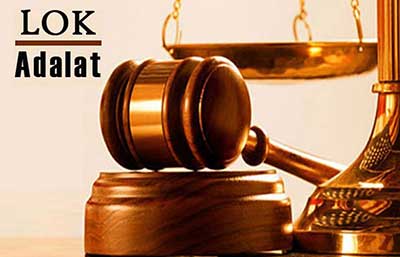Relevance: GS-2: Issues relating to development and management of Social Sector/Services relating to Health, Education, Human Resources
Key Phrases: Adjudicatory function, Award, Decree, Lis, Law giver , Compromise decree, Statutory status, Pre-litigation stage, Equal justice and free legal aid, Alternate Dispute Redressal
Why in News?
- The Supreme court noted that the Lok Adalat’s jurisdiction under Sec 20,Legal Services Authorities Act ,1987 is to facilitate the resolution of disputes between the parties in a case.
- It serves no adjudicatory function. It cannot make a decision on a lis. All it can do is facilitate a genuine compromise or settlement. Subsection (4) of Section 20 is significant in that the lawmaker has established the guiding principles for a Lok Adalat.
Supreme Court Observations in New Okhla Industrial Development Authority (NOIDA) vs Yunus Case 2022:
- Award passed by a Lok Adalat under Section 20 of the Legal Services Authorities Act, 1987 cannot be the basis for redetermination of compensation as contemplated under Section 28A of the the Land Acquisition Act, 1894.
- This made two things clear
- The purport of the law giver is only to confer it with enforceability in like manner as if it were a decree.
- Thus, the legal fiction that the Award is to be treated as a decree goes no further.
Kerala High Court judgment in Thomas Job v. Thomas 2003 (3) KLT 936
- An Award passed by the Lok Adalat is not a compromise decree. An Award passed by the Lok Adalat without anything more, is to be treated as a decree inter alia.
What is a compromise decree:
A compromise decree is not a decision of the Court, nor can it be said that a decision of the Court was implicit in it. It is the acceptance by the Court of something to which the parties agreed.
Lok Adalat:
Lok Adalats (the term literally translates into “people’s Courts) were first set up in Gujarat. Soon after Gujarat, Maharashtra commenced what was called Lok Nyayalayas in 1984, just two years later.
- Lok Adalats are institutions of justice delivery which are meant to be more approachable, accessible, faster and more relevant for the common masses, especially those in our vast, sometimes remote, rural hinterlands.
- Lok Adalats have been given statutory status under the Legal Services Authorities Act, 1987.
- The award (decision) made by the Lok Adalats is deemed to be a decree of a civil court and is final and binding on all parties and no appeal against such an award lies before any court of law.
- Usually, retired or serving judges as well as judicial officers are appointed to the benches at Lok Adalats. Sometimes, other eminent personalities are appointed as well.
- Permanent Lok Adalats: Instead of the usual Lok Adalats which are set up periodically at all levels of justice administration, these are more structured, permanent bodies which function as full-time Alternate Dispute Redressal forums.
Functions of Lok Adalat:
- Alternate Dispute Redressal (ADR) mechanisms: It is a forum where disputes/cases pending in the court of law or at pre-litigation stage are settled/ compromised amicably.
- Providing free legal aid to those who are underprivileged and may
be denied justice simply owing to a lack of resources.
- There is no court fee payable when a matter is filed in a Lok Adalat.
- Article 39(A) - Aims of providing for equal justice and free legal aid to all those in need.
- Reducing burden on the courts: With wide scale adoption in the
last nearly four decades they also aim to tackle the overbearing pendency of
cases in courts across India.
- More importantly, also solve disputes at the pre-litigation stage itself.
- The decision of a Lok Adalat is not appealable. Hence a complete attempt at a judicial decision is made.
Case Study showing Importance of Lok Adalat -
In 2020, a daily wager in Odisha sued the Prime Minister of India in a Lok Adalat. He stated that he had applied for an Adhaar card and failed in as many as 21 attempts to get one. Reasoning that the Prime Minister “is responsible for the implementation of Aadhaar”, he decided to lodge a case at the permanent Lok Adalat in Phulbani, the district headquarters of Kandhamal district from where he hails.
Leaving aside the specifics of the case, the fact that someone so underprivileged had access to judicial resources in a time and at a place of his convenience owing to the existence of Lok Adalats is something truly praiseworthy.
Challenges faced by Lok Adalat:
- Increased settlement time: As it is said “Justice delayed is justice denied”. Therefore speedy resolution still remains the main issue.
- Reluctant Lawyers: For personal benefits, lawyers usually hesitate to refer the matters for settlement in Lok Adalat.
- Lack of awareness among people: Due to high illiteracy they fail to recognize their right to free legal aid.
- Not organizing Lok Adalat on regular basis: This leads to increasing cases in court and overburdening which defeats the purpose of Lok Adalat.
Lok Adalat is very effective in settlement of money claims. Disputes like partition suits, damages and matrimonial cases can also be easily settled before Lok Adalat, as the scope for compromise through an approach of give and take is high in these cases.
Given the large (and growing) burden of pendency and the prevalence of illiteracy, especially among those who benefit the most from such a low-barrier arrangements, Lok Adalats have indeed played an important role in advancing the constitutional principles of “equal access to justice” for all in the country.
Mains Question:
Q. Lok Adalat is one of the alternative dispute redressal mechanisms. How it is becoming more important in present society. While enumerating challenges faced by it suggest measures to strengthen Lok Adalat. [250 words]









